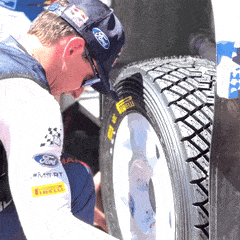- Kritkarr
- Posts
- On a Roll: The Importance of Regular Tire Rotation
On a Roll: The Importance of Regular Tire Rotation
Ever found yourself wondering why your car's tire wear seems uneven, or why you're not getting the smooth ride you were promised? Tire rotation might just be the answer you're looking for, and it's way more important than you might think!

Why Rotate Your Tires?
Tire rotation involves changing the position of your car's tires in a methodical way to ensure even tire wear. It's not just about prolonging your tires' lifespan (although that's a huge perk); it's also about maintaining good traction on the road, which translates to better fuel efficiency and safer driving.
"Skimping on tire rotation is like skipping a dentist appointment. It might not bother you now, but down the road, you'll wish you hadn't!"
When to Rotate?
Every vehicle might have specific recommendations, but a general rule of thumb is to rotate your tires every 5,000 to 7,500 miles. Haven't kept track of your mileage? Making it a habit to do it with every oil change can be an easy way to remember.
DIY Tire Rotation
Want to tackle tire rotation yourself? Here’s a quick checklist to get you rolling:
Check your car's manual for any specific rotation patterns recommended for your vehicle.
Safety first: Ensure your car is parked on a flat surface, and use jack stands.
Label your tires with chalk or stickers before removing them. This helps you keep track of their new positions.
Loosen the lug nuts slightly before lifting the car.
Use the right pattern: For most vehicles, the front tires move to the opposite sides of the rear, and the rear tires move straight forward.
Tighten the lug nuts in a star pattern to ensure even tightening.
Remember, it’s crucial to check your tire pressure and adjust it if needed after rotation. Improper tire pressure can counteract all the benefits of rotating your tires in the first place.
Tire Rotation and Mechanics: Don't Get Taken for a Ride
Understanding the whys and hows of tire rotation empowers you to communicate more effectively with your mechanic. It’s not just about saving money by possibly doing it yourself; it’s also making sure you have the knowledge not to be upsold unnecessary services.
"A little knowledge can go a long way in keeping both your vehicle and your wallet in good shape."
By keeping up with regular tire rotations, you're not just ensuring a smoother ride, but you're also taking a proactive step towards safer driving. Remember, maintaining your vehicle's tires is as crucial as taking care of its engine. So, next time you're due for a rotation, consider it as an investment in your vehicle’s longevity and your safety on the road.
Stay safe, stay smart, and keep rolling smoothly until our next issue!